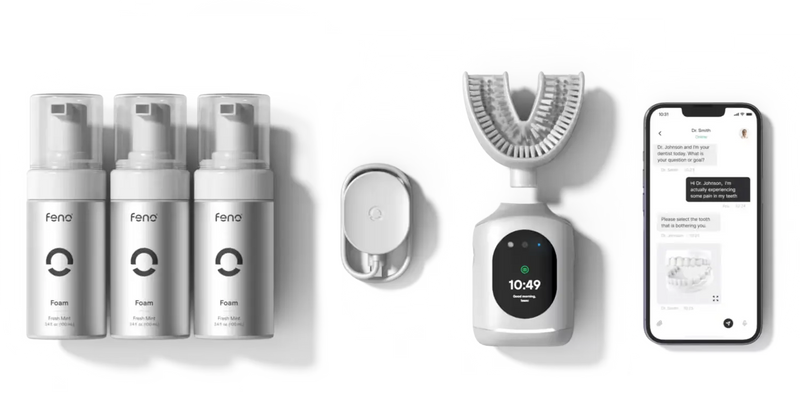
The Truth About Tooth Repair: Your Body's Natural Cavity Defense System
Essential Takeaways
- Your teeth have a remarkable natural repair system called remineralization, which works like your body's own cavity defense mechanism. For this system to work effectively, you need to maintain your mouth's pH above 5.5, allow sufficient time between meals (2-3 hours) for repair, ensure proper mineral levels through diet and oral care, and manage harmful bacteria that feed on sugar. The key insight is that it's not sugar itself that directly causes cavities, but rather the acids produced by bacteria feeding on that sugar. By understanding and supporting these natural repair processes through proper pH balance and timing, you can enhance your body's ability to protect and repair your teeth naturally.
Recent insights from Stanford neuroscientist Dr. Andrew Huberman, along with decades of dental research, have shed new light on a fascinating capability of our bodies that many might find surprising: our teeth can actually repair themselves through a process called remineralization.
The Science of pH and Tooth Remineralization
The critical pH threshold for teeth is approximately 5.5. Here's how the pH balance affects your teeth:
- Remineralization Zone (Above pH 5.5): Creates an environment where teeth can rebuild
- Danger Zone (Below pH 5.5): Triggers mineral loss and potential decay
-
Optimal Range (pH 6.2-7.0): Provides ideal conditions for tooth repair
Common Beverages and Their pH Levels

Debunking the Sugar Myth
One of the most striking revelations challenges a common dental health belief. As Dr. Huberman explains, "Cavities are not caused by sugar. Cavities are caused by bacteria that feed on sugar." The primary culprit is Streptococcus mutans (S. mutans), which produces acid as a byproduct of sugar metabolism.
What makes this particularly interesting is that S. mutans isn't an inherent part of our oral microbiome - it's actually a communicable bacteria. This means it can be transmitted from person to person, and more importantly, its presence in our mouths isn't inevitable.
Understanding the Mineralization Balance
Your teeth constantly cycle between two states:
- Remineralization: The natural repair process
- Demineralization: The breakdown of tooth structure
As Huberman colorfully describes it, it's "either demon or remin," and importantly, these processes cannot occur simultaneously. The remineralization process involves several key minerals:
- Calcium: Primary building block for tooth structure
- Phosphate: Works with calcium to strengthen enamel
- Fluoride: Enhances remineralization speed
- Hydroxyapatite: Forms the basic structure of tooth enamel
These minerals work together to rebuild tooth structure when conditions are favorable. The process requires:
- Proper pH levels
- Adequate mineral availability
- Sufficient time for the process to occur
Time Factors in Natural Tooth Repair
Research shows specific timeframes for effective remineralization:
- Initial mineral deposition: 20-30 minutes
- Significant repair: 2-3 hours
- Optimal results: Regular remineralization cycles
As Huberman emphasizes, "The degree to which cavities have the opportunity to form is dependent on the amount of time... that you are in a demineralization mode or remineralization mode."
Prevention Strategies
Current research is exploring innovative approaches to cavity prevention, including a fascinating discovery involving specific sweeteners like xylitol that act as a "trojan horse" - attracting cavity-causing bacteria but ultimately leading to their demise rather than feeding them. Other promising compounds include:
- Xylitol as a natural bacteria deterrent
- Arginine supplements for pH balance
- Advanced peptide treatments
Practical Tips for Daily Care
This understanding of tooth remineralization opens new possibilities for oral health care:
- Monitor eating windows to allow remineralization time
- Choose pH-balanced beverages
- Use mineral-rich oral care products
- Practice strategic timing of oral hygiene
Frequently Asked Questions
Can teeth actually heal themselves?
Yes, teeth can repair themselves through remineralization when conditions are right. This natural process rebuilds tooth enamel using minerals from saliva and fluoride products.
How long does tooth remineralization take?
Initial remineralization begins within 20-30 minutes, but significant repair requires 2-3 hours of favorable conditions. Consistent care over weeks shows the best results.
What foods help remineralize teeth?
Foods rich in calcium, phosphate, and vitamin D support remineralization. Examples include cheese, yogurt, leafy greens, and fish. Avoid acidic foods that can interrupt the repair process.
How does pH affect tooth health?
pH levels above 5.5 promote tooth repair, while levels below 5.5 cause mineral loss. Maintaining a neutral or slightly alkaline mouth pH is crucial for dental health.
What's the best way to prevent cavities naturally?
Focus on maintaining proper pH levels, allowing adequate time for remineralization, consuming mineral-rich foods, and managing harmful bacteria through good oral hygiene practices.
*This blog is not an endorsement or affiliation with the Huberman Lab podcast. The content is for informational purposes only.

Feno Founders Edition Bundle
Advanced Oral Health in 20 Seconds with the Feno Smartbrush™
Get Yours Now!






